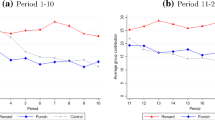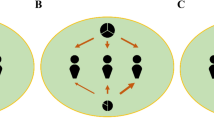Abstract
Public goods production is not necessarily desirable and involves higher costs than is often recognized. Specifically, public goods production may require that a small minority of individuals can collude at the expense of others or impose strategic sanctions on non-contributors. These facilities may have negative as well as positive effects. The same conditions that support public goods production also support business cartels and racial discrimination, for instance. We examine the implications of this perspective for modern debates on economic policy, civic virtue, communitarianism, and libertarianism.
Similar content being viewed by others
References
Axelrod, R. (1984) The Evolution of Cooperation. New York: Basic Books.
Becker, G.S. (1957) The Economics of Discrimination. Chicago: The University of Chicago Press.
Bliss, C. and Nalebuff, B. (1984) “Dragon-slaying and Ballroom Dancing: The Private Supply of a Public Good.” Journal of Public Economics, 25: 1–12.
Browning, C.R. (1992) Ordinary Men: Reserve Battalion 101 and the Final Solution in Poland. New York: Harper Perennial.
Buchanan, J.M. (1994) Ethics and Economic Progress. Norman: University of Oklahoma Press.
Coleman, J.S. (1990) Foundations of Social Theory. Cambridge, Belknap Press of Harvard University Press.
Congleton, R. (1991) “The Economic Role of a Work Ethic.” Journal of Economic Behavior and Organization, 15: 365–385.
Conquest, R. (1986) The Harvest of Sorrow. New York: Oxford University Press.
Constant, B. (1998) [1819] “The Liberty of the Ancients Compared with That of the Moderns,” In: Biancamaria Fontana (transl. and ed.) Benjamin Constant: Political Writings., pp. 307–328. Cambridge: Cambridge University Press.
Coser, R.L. (1991) In Defense of Modernity: Role Complexity and Individual Autonomy. Stanford: Stanford University Press.
Cowen, T. (1991) Public Goods and Market Failures: A Critical Examination. New Brunswick, New Jersey: Transactions Publishers.
Cowen, T. (1992) “Law as a Public Good: The Economics of Anarchy.” Economics and Philosophy, 8: 249–267.
Cowen, T. (1994) “Rejoinder to David Friedman on the Economics of Anarchy.” Economics and Philosophy, 10: 329–332.
Ehrenhalt, A. (1995) The Lost City: The Lost City: Discovering the Forgotten Virtues of Community in the Chicago of the 1950s. New York: Basic Books.
Elster, J. (1989) The Cement of Society. New York: Cambridge University Press.
Freud, S. (1949a) Group Psychology and the Analysis of the Ego. New York: Liveright.
Freud, S. (1949b) The Future of an Illusion. New York: Liveright.
Freud, S. (1961) Civilization and its Discontents. New York: W.W. Norton.
Friedman, M. (1980) Free to Choose: A Personal Statement. New York: Harcourt Brace Jovanovitch.
Frohnen, B. (1996) The New Communitarians and the Crisis of Modern Liberalism. Lawrence: University Press of Kansas.
Gambetta, D. (1988) “Can We Trust Trust?” In: Diego Gambetta (Ed.) Trust: Making and Breaking Cooperative Relations, pp. 213–237. New York: Basil Blackwell.
Gellner, E. (1988) “Trust, Cohesion, and the Social Order,” In: Diego Gambetta (Ed.) Trust: Making and Breaking Cooperative Relations, pp. 142–157. New York: Basil Blackwell.
Goldhagen, D.J. (1996) Hitler's Willing Executioners: Ordinary Germans and the Holocaust. New York: Alfred A. Knopf.
Hardin, R. (1982) Collective Action. Baltimore: Johns Hopkins University Press.
Hayek, F.A. (1944) The Road to Serfdom. Chicago: The University of Chicago Press.
Hechter, M. (1983) “A Theory of Group Solidarity,” In: Michael Hechter (Ed.) The Microfoundations of Macrosociology, pp. 16–57. Philadelphia: Temple University Press.
Hechter, M. (1987) Principles of Group Solidarity. Berkeley: University of California Press.
Hofstede, G. (1980) Culture's Consequences: International Differences in Work-Related Values. Beverly Hills: Sage Publications.
Kalt, J.P. (1981) “Public Goods and The Theory of Government.” Cato Journal, 1: 565–584.
Kandori, M. (1992) “Social Norms and Community Enforcement.” Review of Economic Studies, 59: 63–80.
Kennell, N.M. (1995) The Gymnasium of Virtue: Education and Culture in Ancient Sparta. Chapel Hill: University of North Carolina Press.
Klein, D.B. (Ed.). (1997) Reputation: Studies in the Voluntary Elicitation of Good Conduct. Ann Arbor: University of Michigan Press.
Koford, K.J. and Miller, J.B. (Eds.). (1991) Social Norms and Economic Institutions. Ann Arbor: Univeristy of Michigan Press.
Kressel, N.J. (1996) Mass Hate: The Global Rise of Genocide and Terror. New York: Plenum Press.
Kuran, T. (1995) Private Truth, Public Lies: The Social Consequences of Preference Falsification. Cambridge: Harvard University Press.
Lichbach, M.I. (1995) The Rebel's Dilemma. Ann Arbor: The University of Michigan Press.
Lichbach, M.I. (1996) The Cooperator's Dilemma. Ann Arbor: The University of Michigan Press.
Mandeville, B. (1988) The Fable of the Bees, or Private Vices, Publick Benefits. Indianapolis: Liberty Classics.
Mansbridge, J.J. (1980) Beyond Adversary Democracy. Chicago: University of Chicago Press.
Michels, R. (1959) Political Parties: A Sociological Study of the Oligarchical Tendencies of Modern Democracy. New York: Dover Publications.
Misztal, B.A. (1996) Trust in Modern Societies: The Search for the Bases of Social Order. Cambridge: Polity Press.
Montesquieu, Baron de. (1975) [1748] The Spirit of the Laws. New York: Hafner Press.
Olson, M. (1965) The Logic of Collective Action. Cambridge: Harvard University Press.
Petit, P. (1995) “The Cunning of Trust.” Philosophy and Public Affairs, 24: 202–225.
Putnam, R.D. (1995) “Bowling Alone: America's Declining Social Capital.” Journal of Democracy, 6: 65–78.
Rahe, P.A. (1992) Republics: Ancient and Modern: Classical Republicanism and the American Revolution. Chapel Hill: University of North Carolina Press.
Rahe, P.A. (1994) “Antiquity Surpassed: The Repudiation of Classical Republicanism,” In: David Wootton (Ed.) Republicanism, Liberty, and Commercial Society 1649–1776, pp. 233–269. Stanford: Stanford University Press.
Rawson, E. (1969) The Spartan Tradition in European Thought. Oxford: Clarendon Press.
Rummel, P.J. (1995) “Democracy, Power, Genocide, and Mass Murder.” Journal of Conflict Resolution, 39: 3–26.
Schelling, T.C. (1984) Choice and Consequence. Cambridge: Harvard University Press.
Schotter, A. (1981) The Economic Theory of Social Institutions. Cambridge: Cambridge University Press.
Smith, A. (1937) [1776] An Inquiry Into the Nature and Causes of the Wealth of Nations. New York: The Modern Library.
Sugden, R. (1986) The Economics of Rights, Co-Operation and Welfare. New York: Basil Blackwell.
Sutter, D. (1994) “The Discovery of Knowledge and Constitutional Systems: A New Perspective on the Provision of Public Goods.” Journal of Institutional and Theoretical Economics, 150: 401–410.
Sutter, D. (1998) “Leviathan at Bay: Constitutional versus Political Constraints on Government.” Economic Inquiry, 36: 670–678.
Thurston, R.W. (1996) Life and Terror in Stalin's Russia 1934–1941. New Haven: Yale University Press.
Tocqueville, A. de. (1966) [1835] Democracy in America. New York: Harper and Row.
Triandis, H.C. (1995) Individualism and Collectivism. Boulder, Colorado: Westview Press.
Tullock, G. (1971) “The Paradox of Revolution.” Public Choice, 11: 89–100.
Ullman-Margalit, E. (1977) The Emergence of Norms. Oxford: Clarendon Press.
Young, H.P. (1993) “The Evolution of Conventions.” Econometrica, 61: 57–84.
Author information
Authors and Affiliations
Rights and permissions
About this article
Cite this article
Cowen, T., Sutter, D. The Costs of Cooperation. The Review of Austrian Economics 12, 161–173 (1999). https://doi.org/10.1023/A:1007864125523
Issue Date:
DOI: https://doi.org/10.1023/A:1007864125523




